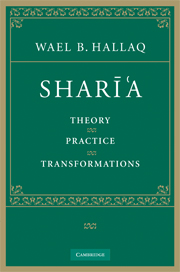Book contents
- Frontmatter
- Contents
- Preface and acknowledgments
- Introduction
- Part I The pre-modern tradition
- Part II The law: an outline
- 6 The legal pillars of religion
- 7 Contracts and other obligations
- 8 Family law and succession
- 9 Property and ownership
- 10 Offenses
- 11 Jihād
- 12 Courts of justice, suits and evidence
- Part III The sweep of modernity
- Appendix A Contents of substantive legal works
- Appendix B Chronology
- Bibliography
- Index
10 - Offenses
Published online by Cambridge University Press: 05 June 2012
- Frontmatter
- Contents
- Preface and acknowledgments
- Introduction
- Part I The pre-modern tradition
- Part II The law: an outline
- 6 The legal pillars of religion
- 7 Contracts and other obligations
- 8 Family law and succession
- 9 Property and ownership
- 10 Offenses
- 11 Jihād
- 12 Courts of justice, suits and evidence
- Part III The sweep of modernity
- Appendix A Contents of substantive legal works
- Appendix B Chronology
- Bibliography
- Index
Summary
Introduction
It is for good reason that this chapter is not entitled “criminal law” or “penal law.” The concepts of criminality and, in particular, penal justice are at the forefront of what Foucault characterized as a carceral system symptomatic of an epistemic transformation that overtook Europe between the seventeenth and nineteenth centuries, but which later became standard in the great majority of non-European legal and political systems. To term that Sharīʿa branch which deals with offenses against life, body, morality, public conduct and property “criminal” or “penal” is to be conceptually imprecise, since far from all of its infractions can be subsumed under modern notions of criminality. Even more importantly, the modern conceptualization of crime and penal law was not shared, in any marked way, by the Muslim jurists of the pre-modern era, for their notions served epistemic imperatives that fundamentally differed from those enshrined in and by the modern state and its systems. While the state's conceptions of criminality and penal codification were integral to its formation as a political-legal culture, the Sharīʿa obviously was not a state and never partook in the construction of such an entity. To speak of criminality and penal law in the Islamic context is not just to inject into the pre-modern Sharīʿa notions that belonged to it only in part, but also to attribute to it notions that were conceived differently in terms of both function and structure.
- Type
- Chapter
- Information
- Sharī'aTheory, Practice, Transformations, pp. 308 - 323Publisher: Cambridge University PressPrint publication year: 2009



